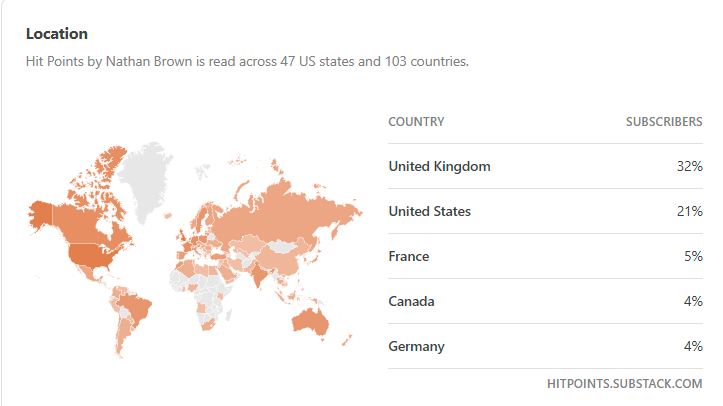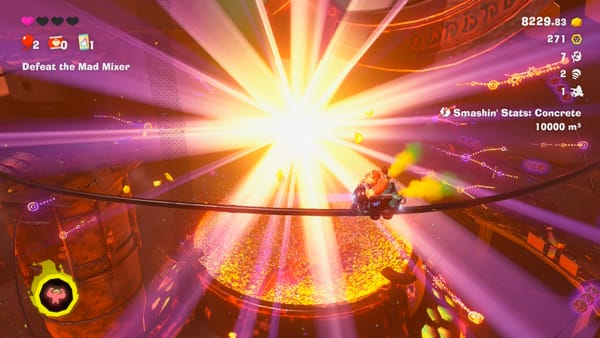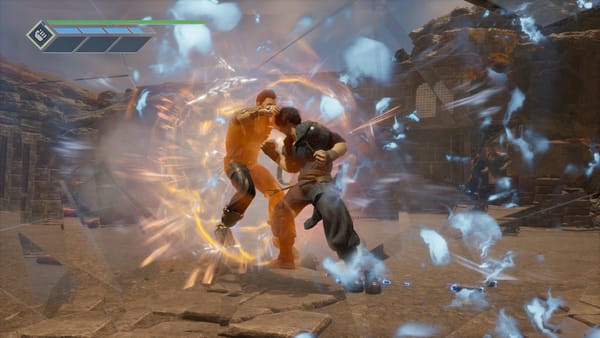#181: Death in service
Another batch of 'forever games' crumbles into dust.

It must be horrible to work on a failing live-service game, ploughing on through the content roadmap, the events and seasons and balance patches, while the graphs tumble unstoppably down. All you can do is try not to look at them, keep spending money, and pray for some magic to happen.
A developer friend once told me about the time they launched a much-awaited online beta that the team knew wasn’t going to meet players’ expectations. They compared it to watching a magician attempt some elaborate, enormously dangerous trick: straitjacket, padlocked chains, big tank of water, that sort of thing. “You’re watching this magician,” my friend said, “and you’re like, oh my god, he’s going to fucking die.”
I was suddenly reminded of that last week when a raft of live-service games announced they were shutting down. Rumbleverse, Knockout City, Apex Legends Mobile, Battlefield Mobile, CrossfireX, Echo VR… there are probably some I’m missing, too, as the latest round of publisher fiscal results brought news of numbers going down, headcounts being cut, and entire games being thrown into the bin. For how long had the developers of these games seen the writing on the wall but had to bugger on regardless, desperately hoping for a turnaround that they knew deep down was never coming? For how many months did they have to watch the magician drown?
It is rough stuff, this, and my thoughts are with everyone affected. More broadly, my thoughts are with all the developers whose corporate paymasters have, at various points over the last half-decade, looked hungrily at the success of Fortnite, Rocket League, Genshin Impact and all the rest and, dollar signs in their eyes, set their teams about making a live-service hit of their own. How hard can it be?
Pretty hard, it turns out. It is difficult enough for a new release to find any sort of audience in these ultra-competitive times. It gets even harder when so much of the industry is making games that are designed not merely to be played and enjoyed, but played and enjoyed every day forever more — built around daily, weekly and seasonal resets, monetised through character cosmetics, booster items and battle passes. There is only room for so many of these things, and I would venture we already have many more than we need.
While live-service developers are chasing the dream, and aping the style, of today’s console and PC smash hits, the roots of this sort of thing lie in the boggy, bloody battlefield of the free-to-play mobile space. Yet the pretenders to Fortnite’s throne have failed to notice the smartphone sector’s greatest trick: the soft launch. Mobile-game developers don’t just throw a game straight out into the world: they launch it in a select few territories, measure its performance against their key performance indicators, then turn a few dials and see if things improve. If a game does well, they’ll announce it properly and launch it globally; if it doesn’t, they’ll quietly kill it off, turn their attention to their next prototype, and start over.
Needless to say, this is a much more efficient, and far less embarrassing, way of conducting live-service business. You know Supercell for its smash hits, its Hay Days and Clash Royales, but not its quiet little failures, which by the developer’s own admission outnumber its actual releases by a ratio of almost four to one. On console and PC, there is no real equivalent of this, no way for developers to test a theory at scale without making it available worldwide. Mobile developers quietly put their failures in the bin; on console and PC, we announce them on investor calls, showing the world our whole ass. This seems less than ideal, to me. Suboptimal.
(As an aside, I often wonder what it’s like to live in one of the countries mobile-game developers use for soft launches. The app stores must look very different in Ireland, Canada, New Zealand or the Philippines. If you’re reading this and live in one of those places, please consider how powerful you are! You are able to positively dictate the future direction of travel of a multibillion-dollar industry! The rest of us can only write modestly successful newsletters in an attempt to influence things.)
This latest round of cancellations does make me wonder whether the industry is turning a bit of a corner. Ever since the app stores exploded, and Destiny came along and rewrote the rulebook for user engagement and retention in a console game, it’s felt like the entire industry has been charging headlong towards this stuff, dreaming of jobs for life and infinite revenue streams. Yet these days a game’s lack of live-service hooks is as much of a marketing asset as the inclusion of them was a few years ago. The savvier companies are now keenly aware that players have grown weary of the live-service style guide, that they are sick of cosmetic stores, loot grinds and battle passes; that there are enough weekly resets in their gaming lives already, and they are no longer on the hunt for a forever game, to the extent that they ever were in the first place.
The economics of modern big-budget game development are a nightmare. You either have to sell ten million copies — hence the recent trend for big-ticket movie licenses — or you have to extend a game’s shelf life to give you more time to claw back your development budget, which as Sam points out up top, just costs you even more over time. This is why so many triple-A games have become so big and so bloated, and why so many of them have joined the live-service goldrush despite the odds being so firmly stacked against them. But there is a rapidly growing body of evidence to show just how vanishingly small a chance the average live-service game has of finding an audience. That has swelled considerably over the past week, and I suspect we are not done yet. We are running out of magicians, I fear, and I can only hope a change is coming. The bodies are piling up at the roadside, and you can only look at them for so long before you decide to turn off at the next exit.
***INTERMISSION***
Forgive me the interruption, but Substack launched a new feature this week that shows a publication’s reach around the world. Hit Points, I discovered this morning, is read in 103 countries, and 47 US states. Incredible! I am, however, very disappointed in the residents of South Dakota, West Virginia and Kansas, who are holding out on me for reasons unclear. Perhaps a speaking tour is in order. Should probably swing by Greenland while I’m at it.
Anyway, thank you all so much for reading, wherever you are in the world. I am really quite humbled. Here’s the map, if you’re interested, which I hope you are. I could look at this all day (and sort of have).

MORE!
- There’s a Nintendo Direct tomorrow. Celebrate! Jump into the Discord if you’d like to discuss it live.
- Speaking of Nintendo, its latest financial results saw Switch leapfrog the lifetime sales of Game Boy and DS, with 122.55m of the things now sold. The console is also rapidly closing in on a billion game sales. Despite all that, revenue and profits are both on the slide, and the company has again reduced its hardware forecasts for the current fiscal year.
- Take-Two also announced its results yesterday, along with a $50m ‘cost reduction programme’ that will see fat trimmed in “personnel, processes, infrastructure and other areas, [which] will primarily focus on corporate and publishing functions.” Is this… capitalist virtue-signalling? Gah. In fairness, intimidatingly hench Take-Two CEO Strauss Zelnick has since clarified the publisher “doesn’t expect any kind of broad-based reduction in force.” We’ll see.
- Apple has taken issue with the UK Competition And Markets Authority’s announcement of a phase-two investigation into the iPhone maker’s conduct towards cloud-gaming services. In a statement the company disputed that it has blocked such apps from its ecosystem, and that it has in fact taken “active steps to encourage” them. Not sure Microsoft would agree with that assessment.
- Loveable Double Fine bossman Tim Schafer will be inducted into the Academy Of Interactive Arts And Sciences’ Hall Of Fame at the DICE Awards later this month. Good for him.
That’s your lot! Paid subscribers, I’ll see you later in the week. If the rest of you would like to join us, a subscription costs just £4 a month and earns you my eternal adoration and respect (as well as unlocking a whole bunch more Hit Points). Cheerio!





